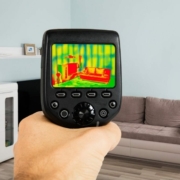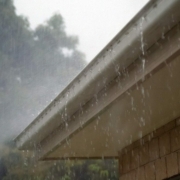Thermal imaging is not a new thing, in fact we use it on every inspection to help us in identifying possible moisture, but it can be beneficial in many other circumstances. It is not magic, and it cannot see through walls. There are certain conditions where it works and where it doesn’t work. It takes a trained and experienced inspector with the right tools to ascertain what the thermal images could mean. That’s why I recently obtained my Certified Residential Thermographer training and certification.

In the following post, I will describe the benefits to a performing a dedicated thermal inspection or as an add-on service when purchasing your new home!
What is a thermal inspection?
Thermographic inspections measure surface temperatures by using infrared cameras. These cameras see light that is in the infrared, or heat, spectrum. The images created record the surface temperature variations of the objects in frame. The created images assist the inspector in identifying thermal abnormalities. These abnormalities are just that, abnormalities. They can identify that something unusual is happening there but it cannot identify what is occurring. Without appropriate follow up inspection such as the use of a moisture meter, the thermal images only provide half the story. Further information can be found at the US Department of Energy’s site.
1. HIDDEN MOISTURE & MOLD
Having mold around the house is always unpleasant, and if it’s left unattended, it can quickly become a health hazard. However, mold cannot grow without moisture. Thermal cameras are great tools to help identify potential moisture in walls and ceilings that would otherwise have gone unnoticed. Remember, it needs to be followed up by using a moisture meter to confirm though. Once these locations are identified though, it becomes a lot easier to deal with this problem. Remove the mold and damaged building components, fix the source of moisture, dry the area out, clean and repair. Remember, this will only work if there is moisture that is at a different temperature than the surrounding building materials. I include a quick thermal scan on every inspection of the walls, ceiling and floors but a full thermal inspection is much more intensive.
2. ELECTRICAL HOTSPOTS
Over time, the electrical wiring system placed throughout the home could begin to deteriorate. Thermal imaging can help identify the locations of electrical hot spots and other anomalies, which if not corrected could lead to potential dangers. During a full thermal inspection, I will scan the interior of the electrical panel and all electrical receptacles and switches. The scan will show a thermographic anomaly (hot spot) on failing connections. Absolutely no electrical connection should be hotter than the other components and wiring on that circuit. Again, this only identifies a potential problem and I will then recommend an electrician further assess the connection point or device. Thermal scans are now required to be performed on many commercial electrical systems on a regular basis. If it’s required for commercial properties, then there is a clear need for this safety inspection and the government has now mandated it.
3. DETECTION OF VARIOUS STRUCTURAL DEFECTS
Walls, floors, ceilings, and roofs will all show a difference in temperature at certain areas due to thermal bridging, assuming an adequate thermal variance between the exterior and interior of the home. A thermal anomaly could indicate that there may be a problem, such as damaged or missing structural components. For roofs, in particular, thermal imaging can show if there is moisture gathering at specific points, indicating that there is a leak somewhere on the roof. During a full thermal inspection, I will scan the exterior and interior of the home as well as the attic. Any anomalies may need further investigation but generally it’s pretty clear what the issue is.
4. ENERGY EFFICIENCY
As a homeowner, nobody likes paying too much for electricity or gas. We should strive to make, and then keep, our homes as energy-efficient as possible. A thermal imaging inspection can help detect areas that could use improvement. Normally, doorways and windows are the biggest sources of air infiltration and thermal imaging will help identify potential areas of improvement. Additionally, a thermal scan can help identify areas of missing insulation by locating areas that the insulation is either not installed or not performing. During a full thermal inspection, I will scan all walls, windows, doors and ceilings looking for anomalies.
5. PEST DETECTION
While this is much harder to detect with a thermal camera, it is possible to identify bees, rodents and even termites in walls or attics. Keep in mind, the thermal camera only looks for variations in heat, so the nest would need to be directly against an interior wall or ceiling and warm enough to conduct the heat into the drywall. This is the opposite of when the thermal imager is used to detect moisture but it still works!
I hope this helps explain what a thermal imager can do for you. A sample thermal report can be found here: https://reports.spectora.com/home-inspectors/my-inspection-company-7d056f8a70/sample_report?sample_id=25776
Please call us if you would like us to perform a full thermal imaging inspection for you!





